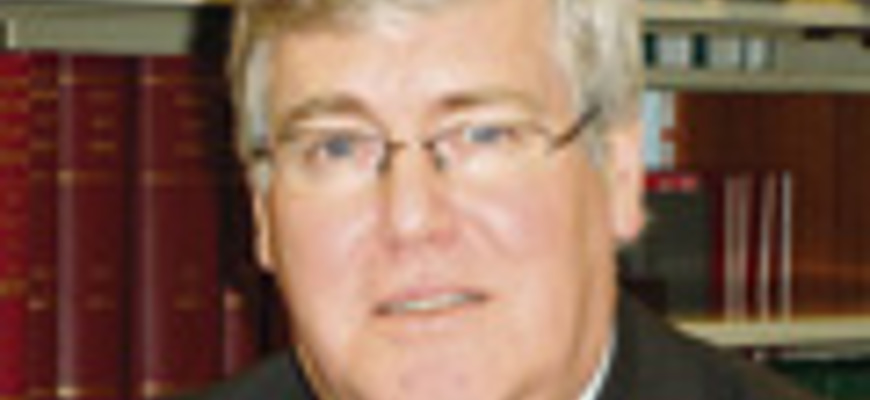One voice

For someone who considers the post “likely to be the single greatest honour that would ever come my way”, Colin Tyre is disarmingly frank about the level of awareness in his native Scotland of the international legal organisation of which he is current President.
“I shudder to think what percentage of my colleagues had never heard of the CCBE, and what it does, until I got the post, but I think it was probably quite large”, he admits.
The advocate and QC, who until the end of the year has to juggle his practice and his part-time role as a Scottish Law Commissioner with fronting the body which acts as the public voice of 700,000 lawyers throughout the EU, is actually the second Scot to lead the 47-year-old CCBE. (The first was David Edward QC from 1978-1980.) Despite that, he recognises that few Scots lawyers will appreciate its influence on matters that affect their daily practice.
In the public interest
“What it’s not is a lawyers’ trade union”, he explains. “It is there to represent the interests of the bars and through them of individual lawyers, but in the sense of protecting the provision of legal services for the public interest, not for the protection of lawyers against interference with unfair practices, or outdated or anticompetitive ways of working. Our preoccupation is to try to identify the things that matter, and to fight for them against people who don’t appreciate the importance of them – by which I really mean consumer organisations and competition authorities who tend to see things in purely economic terms, which all too often are reduced to things such as price of service and not much else.”
If that sounds familiar in a Scottish context, the consumer-led agenda of the Scottish Executive and UK Government is fully reflected in Brussels, where the CCBE finds it equally hard to persuade the European Commission that public interest and consumer interest do not amount to the same thing. “The public interest is something wider in that the public interest is something which requires the availability of legal services, whereas if you leave it purely to the market you may find that there are legal services which just aren’t provided at all.”
That said, the UK Government is very much to the fore with its Legal Services Bill (for England & Wales), of which the provisions permitting external investment in law firms are causing much alarm among continental bars, not to mention some disagreement within the CCBE’s UK delegation. Tyre himself, reflecting the CCBE’s position, is at odds with the Law Society of England & Wales on this point: “I can’t help feeling it is almost inevitable that at some stage a law firm which has non-lawyer ownership is going to find itself getting into situations of conflict of interest, and that individual lawyers could find their independence compromised.”
Separating the core
Nevertheless Tyre knows that many continental bars maintain rules that were scrapped years ago in Scotland as in England, as restrictive practices. While challenging the Commission’s “one size fits all” approach – the histories and politics of the member states are too diverse for that, he asserts – his principal thrust is to seek to identify and protect the core principles of the profession. “It’s not my job to defend every last restrictive practice which operates across Europe. We don’t have a core principle for example which says you must not advertise, which is one of the Commission’s principal bugbears. There are still bar associations in Europe which have their advertising prohibitions and as far as we’re concerned it’s up to them to defend these.
“In short I have some sympathy with the idea that the Commission have a job to do to dismantle restrictive practices. Where I part company from them is that they see that as the only issue in the game, and they do not see that there are other aspects of the provision of legal services which cannot be determined purely by competition theory.”
Thus if there were a threat to professional rules dealing with something like conflict of interest or professional confidentiality, for example, the CCBE would get involved, as happened with money laundering.
Success on the ground
So what success does it have in making its views count? Tyre concedes that at a policy level it is an uphill struggle: three years were spent in a vain attempt to exclude the legal profession from the recently adopted Services Directive. With money laundering too it has had difficulty curbing legislative zeal. But there is a better success rate with particular provisions, such as when an early draft of the Services Directive appeared to treat guarantee funds as being a restrictive practice. “Obviously people like the Law Society of Scotland, who regard that as very important and very much in the public interest, reacted with horror to that. In parallel with our argument on principle we were putting it to the Commission that they should be changing the directive in these respects, and they agreed with us. So do we get success in these areas.”
Ideally, he says, the CCBE would “get in a little bit more on the ground floor” and influence policy as it is being made – perhaps a tall order for a body with a secretariat of only nine or 10 people, despite the energetic leadership of Secretary General Jonathan Goldsmith.
He is less comfortable straying into areas of substantive law, something on which the Commission does regularly come calling. “There is a difficult issue as to the extent to which we should get involved with that, and whether there is realistically such a thing as a CCBE view on these issues… The more you get involved with substantive law, the more you scrape away the consensus among member states and the more you get down to national preferences which nobody’s prepared to give up.”
Making its own agenda
But it would be wrong to view the CCBE as purely a reactive body, and a number of initiatives seek to give the profession across the continent a coherent voice with which to safeguard the public interest. A statement of lawyers’ core principles was finalised last year, and by the time he hosts the next plenary meeting in Edinburgh this May, Tyre hopes that a more detailed commentary will be ready for approval. The Council of Europe has already adopted the initial code.
Tyre himself is particularly keen on a proposed agreement on a set of common outcomes for professional training of lawyers – “if there’s anything this year that I’m rather putting my name to it’s that”. Highly timely, he says, given the freedom with which lawyers can now move from one member state to another. “What we’re trying to achieve is to get everybody to say, by the time a lawyer qualifies for practice they should have the following knowledge, skills, competences and so on, should be able to present a reasoned argument orally or in writing, should be able to interview a client so as to identify the nature of the issue, should be able to conduct a negotiation, should be able to participate in a mediation of a dispute, and a list of other skills and competences of that sort.” Again he hopes for a result during his own term of office.
A CCBE committee has also spent many years assisting the development of an independent legal profession in East European countries, beginning with those bordering the western states and now focusing on the likes of Ukraine and Moldova. Funding is an issue and the CCBE is about to commit to employing someone to establish links with European institutions, possibly with a view to setting up a permanent foundation. Here again there are certain attitudes to be overcome.
“You tend to find that the Commission and even the Council of Europe are happy to put lots of money into training judges, prosecutors and court officials, but they don’t want to spend money training lawyers because there’s an attitude that lawyers are rich people with plenty of money themselves. But the reality of the matter is that in Eastern Europe that simply is not the case. Lawyers there are very poor people and they are an essential ingredient in the system working properly.”
National positions
It might be thought a wonder that the CCBE ever agrees anything, given the diversity not just of the European legal systems but the methods of regulation of the profession, and Tyre concedes that much time can be spent at meetings by the now 31 national delegations simply stating their own positions rather than actively seeking common ground. “It’s the European problem in miniature: with that number of people round the table it can be difficult to get things agreed. Especially when they’re all lawyers!”
But despite the inevitable conflicts that arise, and the delicacy of his own situation in trying neither to “sound like a dinosaur” in supporting traditional practices, nor to appear simply to be adopting the England & Wales position, Tyre insists that holding the CCBE presidency is “a huge privilege”. “It’s something that I never dreamed would happen, to get the opportunity to be president of an organisation which represents all the lawyers in Europe.”
“Solicitors and advocates should know that they are part of a bigger picture.”
WHAT IS THE CCBE
Created in 1960, the Council of Bars and Law Societies of Europe (CCBE) represents the professional bodies from the member states of the European Union and the European Economic Area before the European institutions, and through them some 700,000 European lawyers.
Its objectives are :
- To represent its member bars and law societies on all matters of mutual interest relating to the exercise of the profession of the lawyer, the development of the law and practice pertaining to the rule of law and administration of justice and substantive developments in the law itself, both at a European and international level;
- To act as a consultative and intermediary body between its members, and between the members and the institutions of the EU and the EEA on all such cross border matters of mutual interest;
- To monitor actively the defence of the rule of law, the protection of the fundamental and human rights and freedoms, including the right of access to justice and protection of the client, and the protection of the democratic values inextricably associated with such rights.
A permanent delegation to the European Court of Justice and the Court of First Instance of the European Communities, and to the EFTA Court, is consulted (and makes its own representations) on matters of court procedure.
In this issue
- The bigger picture
- Citizen justice
- Purely rhetoric?
- Purely rhetoric? (1)
- Profit, team by team
- Bring them home
- Bring them home (1)
- Local roots
- Wanted! (for conspiracy)
- One voice
- AGM report
- Dealing positively with client concerns
- Block fees: the story behind the changes
- Think before you charge
- For the high jump
- Jury questions
- Put to the test
- Yet another expense
- Planning with people
- Lifting the lid
- Website reviews
- Book reviews
- Home is where the heart is
- PSG - new certificate of title
- SEPA: apply online and save
- SEPA: apply online and save (1)






